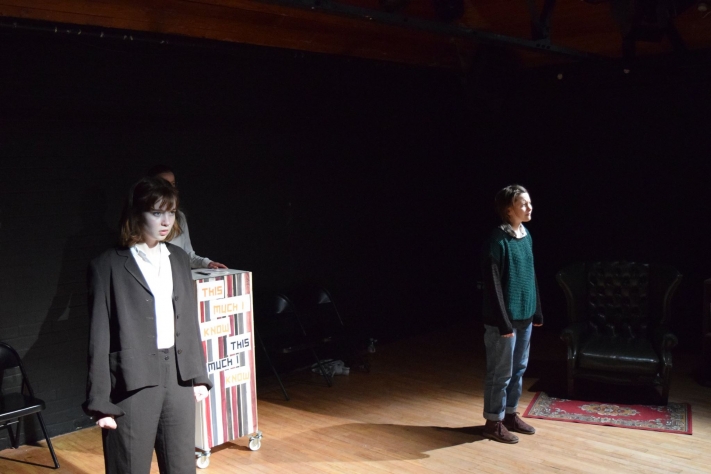This Much I Know from postgraduate student Hannah Greenstreet has as its subject-matter the perils of raising children in a relentlessly competitive environment. On stage we come to learn of an upbringing of two daughters, the child prodigy Eadie and the older sibling Naomi who is left trailing in her wake, by a mother the force of whose competitive spirit is matched by the scope of her delusion. But this is no pièce a thèse where the characters occupy relatively fixed, representational positions. Greenstreet has chosen to do a more difficult thing by presenting us with a psycho-drama that charts the ebb and flow of the relationships – each sister with the mother, the sisters with each other, and their dealings with Naomi's wife Alex with whom she's thinking of having a baby.
To trace in detail the winding path trodden by our four characters would constitute something of a spoiler given that events don't follow their anticipated development. Suffice it to say that the key set-up of a quasi-quiz show with the mother as both genial compère and formidable interrogator is a boldly recurring dramatic stroke, while Greenstreet also shows her grasp of detail in the way she extracts remarkable resonance both from the simple act of ordering a tea or coffee in a café and from a chilling moment of stage business involving family photos. The quiet scenes between Naomi and Alex, though later their emotional temperature rises, contrast effectively with the pressure-cooker atmosphere elsewhere. I also admired the way that the writer has constantly leavened the intensity of the drama with humour:
"You got that line from Mum. You're such a parrot!"
To manage all of this in a brief 80 minutes running time is a small miracle of compression, but there's never any sense of rush or strain.
Writing of this order demands and here gets committed direction and skilled acting from its four interpreters. Director Cesca Echlin has all of her players on stage all of the time, either acting or observing the action. This heightens the impression of all four being locked by their past and uncertain future into a sort of grotesque dance. The staging of the 'quiz show' is done with a degree of reality, complete with canned music, that creates uncertainty in the audience as to the precise nature of what they are seeing, and the use of coloured lighting also suggests abnormality.
Matilda Hadcock makes the most of the juicy role of mother/quizmaster. Rigid of posture, her permanent toothpaste grin, and slightly puppet-like movements had me looking hard at her to check that she was human rather than humanoid or even android! Relentlessly upbeat, convinced of her own righteousness, her theoretical rather than emotional engagement with her daughters was startling. To the harassed Eadie, in the quiz show: "What is your worst failing?" Receiving the reply: "My lack of social skills", she chirps: "Correct!" Then when the now-suffering Eadie protests at her continuing participation in the show, she coldly retorts: "You've signed up. You have to finish!", her raison d'être lying in her mantra: "I was blessed with two talented girls. It was my duty to share them with the world."
Martha Harlan makes of the prodigy Eadie a convincingly confused, ultimately pitiable figure. The tenseness of her first meeting with Naomi and Alex is nicely shown by her underlying touchiness while trying too hard to be inclusive. Harlan is also at ease as her abrasiveness towards Naomi ("You gave up on yourself. No one likes a quitter.") curdles into pathetic pride as she announces: "I have made a 5-year plan and I've been hitting all my targets!" and later into despair as she admits she never takes annual leave.
Susannah Townsend's Naomi is an effectively slouching figure in sweater and jeans – though her and Harlan's command of their lines after a strenuous and comical series of skipping, press-ups and star jumps was admirable! Townsend gives Naomi lots of heart and perseverance when it would have been easier for her to be not much more than a put-upon victim. Rowan Wilson makes of her Alex a persuasively rational figure amidst the angst, struggling to avoid being sucked into the recriminations. Asked what she wanted to be when she grew up, "a lesbian!" she proclaims proudly.
The other New Writing Festival offerings will have to go some to match the quality of Hannah Greenstreet's writing – this much I think I know. For this is sophisticated, disciplined drama that never permits itself to slide into the tempting clutches of cliché or self-indulgence, let alone into the heightened grip of melodrama. It also leaves us with a sense of hope that perhaps the effects of crucifying nurture can be combated as the characters at the end take tentative steps towards rapprochement.
Greenstreet told me afterwards that this is her third full-length play. In This Much I Know she too has hit all her targets, holding a mirror up to her student audience, itself of course the product of an ultra-competitive selection process, and demonstrating an imaginative grasp of the intricacies of the human heart that suggests the sky's the limit in future for this very considerable talent.




 Part of
Part of 